
|
|
|
Jeep FAQ How-To Articles Quick Reference Product Reviews My Buildup Random Home |
Well pretty much anytime you go through water, you should have your front wheel bearings apart for inspection/regreasing. Anytime your hub deep in water it will flood in between the axleshaft and spindle, filling your hub full of water. Most manual hub setups are similar to this, the one I'm working on is out of an 80 Jeep Wagoneer. This was after cleanup, so this is the complete collection of tools I used. To do this you must have a special lock nut socket ($10 at most parts stores), and snap-ring pliers. The torque wrench was used on the lug-nuts, so I guess it isn't 100% necessary. The tooth brush in the picture helped a ton while trying to clean out all of the ridges and splines of everything. 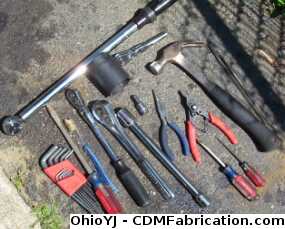 Start by removing outer half of the hub: 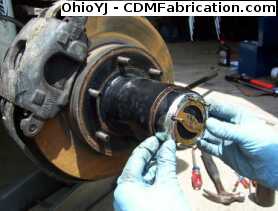 You did get snap ring pliers right? Remove the snap ring on the end of the axle shaft: 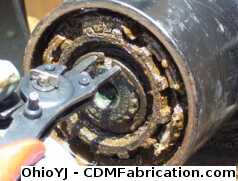 This step is fun, trust me. There is a retaining ring on the outer edge of the hub housing, use a small screw driver to pry it up and remove it. 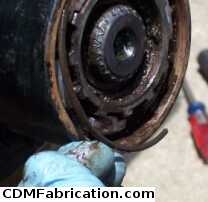 After this, the bottom half of the hub should just pull out. 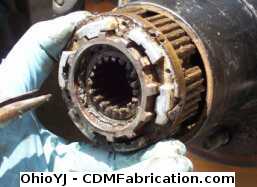 Here's where the special socket comes into play, you have to remove a lock nut, lock washer, and another lock nut, one right after another. 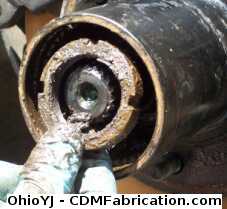 Here are the two lock nuts, and the lock washer. You can see the lock nut on the left has a nipple on it, the lock washer locks that nipple in place, then the outer lock nut keeps the lock washer in place: 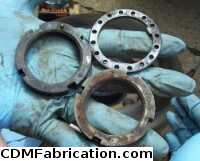 You can now remove the brake caliper, if you have not already done so. Then the whole rotor/hub assembly should just pull off. Remove the rear seal, and remove the inner bearing, the outer bearing should fall out from the front. Due to the exsposure to water, I'm using a quality marine grease instead of standard wheel bearing grease. If you've never packed bearings before, its really quite simple, just messy. Get a good glob of grease in one hand, and take the bearing in the other hand and tap the bearing into the palm of your other hand. This will slowly force grease up into the bearing, you can see it oozing out the top of the bearing in the picture: 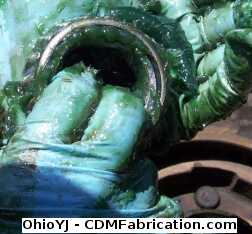 In my case I also had to disassemble my Warn hubs for cleaning. Warn hubs use sort of spiral spring type lock ring. Once you grab the edge of it, you can just pull it up like so: 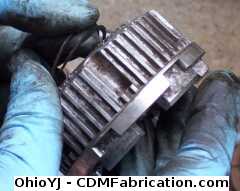 There is a spiral ring on both side of the hub. Once you remove the outer one, the hub will come completely apart. 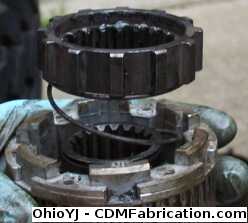 Notice the shiney spots on the teeth? I had to debur the edges with a file, as for some reason Warn hadn't, so the hubs worked kind of rough and jammed up. Now the rings slide in and out smooth as butter: 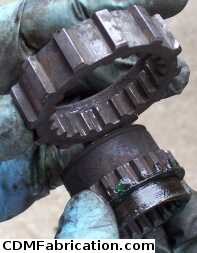 Careful you don't loose the brass bushing on the back side of the hub. Warn recommends not using any grease on their hubs, they recommend a light weight oil on the brass bushing. Mine were already trashed so I used a thin coat of marine grease. If you take time to clean everything up, everything should work and look good as new: 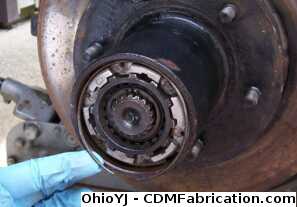 Now for the Haynes manual type of instruction, Assembly is the reverse of the removal. :D Don't do what I did, forget about the spindle bearing and seals. I forgot to replace the spindle seals, and re-grease the spindle bearing. One month later, I had to repeat this entire process again. Spindle and seals: 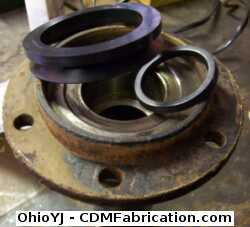 |
| © Copyright 2006 - 2025 Mike Lee | |